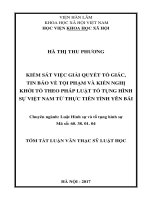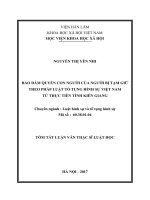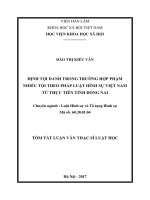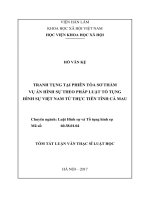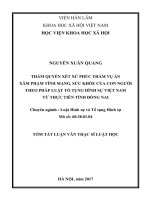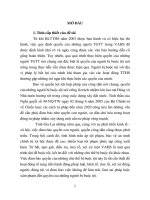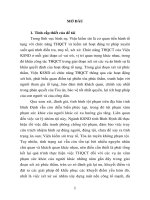Chứng minh trong tố tụng hình sự việt nam từ thực tiễn tỉnh đồng nai tt tiếng anh
Bạn đang xem bản rút gọn của tài liệu. Xem và tải ngay bản đầy đủ của tài liệu tại đây (266.39 KB, 27 trang )
VIETNAM ACADEMY OF SOCIAL SCIENCES
GRADUATE ACADEMY OF SOCIAL SCIENCES
L
NGUYEN TRUC THIEN
THE EVIDENCE IN VIETNAM’S CRIMINAL
PROCEDURE - A CASE STUDY OF DONG NAI
PROVINCE
Major: Criminal law and criminal procedure
Major code: 9.38.01.04
SUMMARY OF THE DOCTORAL DISSERTATION
IN LAW
Hanoi - 2019
The dissertation completed at Graduate Academy of Social Sciences,
Vietnam Academy of Social Sciences
Supervisor: Assoc. Prof. Dr. HOANG THI MINH SON
Reviewer 1: Prof. Dr. Bui Minh Thanh
Reviewer 2: Prof. Dr. Ho Trong Ngu
Reviewer 3: Dr. Quan Minh Cuong
The dissertation will be defended at Graduate Academy Level
Council of dissertation assessment at Graduate Academy of Social
Sciences, Vietnam Academy of Social Sciences, 477 Nguyen Trai,
Thanh Xuan, Hanoi.
Time: ………… date ………. month …… …year 2019
The dissertation may be found at:
- Vietnam National Library;
- Graduate Academy of Social Sciences Library
INTRODUCTION
1. The necessity of the research topic
The evidence in criminal procedure is one of the important and
fundamental theoretical issues of the criminal procedure. The 2015
Criminal Procedure Code regulated evidence and proofs into a separate
chapter, chapter VI of the Code. In fact, however, the fighting against
crimes, especially in the current period, the situation of crimes is very
complicated, their modes and tricks are very sophisticated. In the
process of performing functions and duties, the competent procedural
agencies and the competent procedural persons, have not yet thoroughly
resolved the procedural issues, this leads to determine the objective
truths of cases still have many mistakes, leading to the investigation,
prosecution and trial of wrong people and crime, so there are still many
cases of unfair trial of innocent people and leaving crimes.
Continue to further study the evidence in criminal procedure as a
very important and significant content both theoretically and practically,
contributing to the protection of human rights and improving the
efficiency of crime prevention in the current period. Therefore, the
author chose the research work titled “The evidence in Vietnam’s
criminal procedure - A case study of Dong Nai province” as her
doctoral dissertation in law.
2. Research purpose and tasks
2.1. Research purpose
By examining and clarifying some theoretical issues and the
provisions of the law related to the evidence in criminal procedure, as
well as the reality of the evidence in criminal procedure in Dong Nai
province, the dissertation offers solutions to improve the provisions of
1
the criminal procedure law as well as other solutions to ensure and
further improve the quality of the evidence in criminal procedure.
2.2. Research tasks
Reviewing literature at home and abroad, that related to the evidence
in criminal procedure, pointing out agreed and controversial points that
have not bee thoroughly resolved, and the points need to be addressed
by the dissertation. Studying and understanding the provisions of the
criminal procedure law of a number of countries in the world on the
evidence in criminal procedure and pointing out similarities and
differences, as well as lessons for Vietnam. Assessing the real situation
of the evidence in criminal procedure when solving criminal cases in
Dong Nai province, pointing out the advantages, limitations and their
causes in practice of proving the criminal cases.
3. Research subject and scope
3.1. Research subject
Research subject of the dissertation is the theoretical issues on the
evidence in criminal procedure, the provisions of Vietnam’s criminal
procedure law on the evidence in criminal procedure, referring to
foreign criminal procedure law and the implementation of the
provisions of Vietnam’s criminal procedure law on the evidence in
criminal procedure in Dong Nai province in practice.
3.2. Research scope
The dissertation examines the evidence in criminal procedure under
the Vietnamese law and referring criminal procedure law of some
countries around the world.
Regarding time and spatially, the dissertation examines the practice
of evidence in the proceeding stages conducted by investigating bodies,
2
procuracy and courts in Dong Nai province between 2008 and June
2019.
4. Methodology and research methods
4.1. Methodology
The dissertation examines the evidence in criminal procedure
according to the method of interdisciplinary of social sciences,
interdisciplinary of law. It utilizes the method of dialectical materialism
and historical materialism of Marxism - Leninism as well as the Party
and State’s points of view and Ho Chi Minh thought in the fighting
against crime, and protecting human rights and citizen rights in criminal
procedure.
4.2. Research methods
The study uses methods of overview, synthesis, analysis; historical
method, comparison and statistics. However, depending on the research
content, the dissertation will use appropriate methods for each chapter
and section.
5. New contributions of the dissertation
- Regarding the approach: by using the multi-disciplinary and
interdisciplinary research method, especially the methods of legal
philosophy, dialectical materialist method, the dissertation analyzes
clearly the concept of evidence, responsibility of subject and objects of
the evidence in Vietnam’s criminal procedure in Dong Nai form 2008 to
June 2019, thenceforth, serving as a basis for making recommendations
and solutions to improve the efficiency of evidence in Vietnam’s
criminal procedure in general, and in Dong Nai province in particular.
- Regarding to approaching perspective: with a comprehensive and
multidimensional approach to the evidence in criminal procedure
between the provisions of the existing law and practice of evidence in
3
criminal procedure in Dong Nai so as to examine responsibility to prove
and relationship among the procedural authorities in proving crime. The
dissertation clarifies regulations on the evidence as well as the subject
of proving and obligation of proving in criminal procedure to ensure
further human rights, citizen rights and not to be unjustly punished.
- Regarding the generalization of the dissertation: This is an
intensive research work on the evidence in Vietnam’s criminal
procedure. On the basis of research methods and approaches, especially
on the basis of provisions of criminal procedure law and in practice in
order to clarify further, deeper and more complete the evidence in
criminal procedure, thereby discovering causes of limitations and
inadequacies in practice. This has a great significance in the
construction and completion of reasoning, specifically reasoning on
evidence in criminal procedure.
6. Theoretical and practical significance of the dissertation
6.1. Theoretically
The research results of the dissertation contribute to further building
and developing the reasoning on evidence in criminal procedure in our
country.
6.2. Practically
The dissertation can be seen as reference for educational institutions
in law, agencies of law protection, and it has theoretical and practical
significance for procedural bodies, and as reference in the process of
building and amending the Criminal Code, the Criminal Procedure
Code and its subordinate documents, contributing to enriching and
perfecting the reasoning on evidence in Vietnam’s criminal procedure.
4
7. Structure of the dissertation
Besides the introduction and conclusion and references, the
dissertation includes 4 chapters
Chapter 1: Literature review
Chapter 2: The theoretical issues on the evidence in criminal
procedure
Chapter 3: The provisions of the law on the evidence in criminal
procedure and practice of implementing in Dong Nai province
Chapter 4: Requirements and solutions to improve the quality of the
evidence in criminal procedure in Dong Nai
Chapter 1
LITERATURE REVIEW
1.1. Research situation in abroad
Criminal procedure science of international criminal law and foreign
criminal procedure law always ensure that the procedural bodies and the
procedural subjects might handle properly cases, not missing crimes
and avoiding wrongfully. It may be mentioned some following research
works: A.la vu-sin-xky (1950), Teopия судебныx доказательств b
советском праве. Reasoning on judicial evidence in Soviet law,
Moscow Publisher, (translated by the Propaganda Department of the
Supreme People's Court (1967); “Criminal procedure-law and practice”
by Ronaldo V.del Carmen, Sam Houston State University, the United
states of American. This book includes 15 chapters which mainly cover
the rights of the accused, the basic principles under the US criminal
procedure law, an overview of the criminal justice process, and the
provisions on basic rights of the accused. The law on criminal evidence
1989 of the United Kingdom; research documents on the US criminal
5
procedure model by Richard S. Shine and Miranda warning procedure
in the US; Examining Japan’s criminal procedure model by Professor
Byung-Sun Cho; Research report on Italia’s criminal procedure model
by Marco Fabria dated 10 August 2011, this report mentioned the legal
status of suspects, defendants and defense counsels in criminal
procedure.
1.2. Domestic research situation
1.2.1. Research works related to the reasoning on evidence in
Vietnam’s criminal procedure
1.2.2. Research works related to the reality of evidence in
Vietnam’s criminal procedure
1.2.3. Research works related to solutions to improve the quality of
evidence in criminal procedure
1.2.4. The other relevant research works
1.3. General assessment of research situation related to the
dissertation
1.3.1. The issues that the dissertation will inherit and develop
further
Foreign research works give the author with an awareness and
overview of proving crimes in some countries around the world and
solutions that these countries have applied when proving crimes.
Domestic research works have very important significance for the
dissertation, they have synthesized and analyzed comprehensively the
reality of proving crime in Vietnam’s criminal procedure. The process
of building and perfecting the law on the evidence of crimes. Previous
research works help the author to have full and deepen awareness on the
evidence in criminal procedure so that the author might discover
6
limitations and shortcomings of building procedural law in different
historical stages and inherit solutions of these works.
1.3.2. The controversial issues
In the stage of instituting criminal cases, whether or not to carry out
proving activities. This issue has not been clearly shown in the works
mentioned above. Whether all the competent procedural subjects are
proving subjects or several certain subject only; participants in
procedural process are subjects proving criminal cases or not. The
evidence in criminal procedure just covers activities of gathering,
inspecting and evaluating evidences or even activities of using
evidences. Subjects are proven in different stages of criminal procedure
to be the same or different.
1.3.3. The issues need to be further examined by the dissertation
First, presenting theoretical issues on the evidence in criminal
procedure such as concept, characteristics of proving in different stages
of criminal procedure and the correlation among stages; contents of
proving in criminal procedure.
Second, on the basis of studying the provisions of Vietnam’s
criminal procedure law in different historical periods, the author
evaluates and points out the overall picture in the provisions of the law
on the evidence in criminal procedure and clarify inheritance values of
this institution in legislative history of our country.
Third, clarifying the reality of the evidence and pointing out the
achieved results, the limitation and its causes.
Fourth, proposing a number of solutions to ensure better
implementation of activities of proving in criminal procedure. These
solutions include: to further complete the provisions o the criminal
procedure law on the evidence; solutions for those who are responsible
7
for proving; solutions for those who participate in prove and some other
solutions.
Sub-conclusion of chapter 1
Chapter 2
THE THEORETICAL ISSUES ON THE EVIDENCE IN
CRIMINAL PROCEDURE
2.1. Methodological basis of the evidence in criminal procedure
2.2. Concepts, characteristics, purposes and meanings of the
evidence in criminal procedure
2.2.1. Concept of the evidence in criminal procedure
According to the dialectical materialism, every crime that happens in
reality, humans can detect and prove. Everything has its own reflection,
so human activities including their offence leave traces in the objective
world. If the human collect fully, systematically, technically and
scientifically these traces, they can be aware of the evolution of the
crime that has occurred.
The evidence in criminal procedure is a logic thinking activity and
practice of competent subjects as prescribed by law, to be conducted by
collecting, examining and evaluating evidence, and clarifying issues
belonging to the proved objects to properly solve criminal cases based
on determining the objective truths of the cases.
2.2.2. Characteristics of the evidence in criminal proceedings
First, the evidence in criminal procedure is a logic thinking activity.
The competent procedural bodies are responsible for proving crimes.
The accused has rights but not force to prove his/her innocence.
8
Second, the content of the process of proving in criminal procedure
is the collection, examination and evaluation of information, documents
and relevant and meaningful objects to resolve criminal cases.
Third, compared to non-criminal procedure, the evidence in criminal
procedure is the responsibility of competent agencies and persons to
conduct legal proceedings. The accused has the rights to prove but is
not required to prove his/her innocence.
Fourth, the evidence in criminal procedure is conducted during the
process of resolving the case from the settlement of denunciations,
information on crimes and petitions to prosecute until the judgments
and decisions of the Court take effect. However, the purpose and the
way of proving in each stage are different.
Fifth, the nature of the evidence in criminal procedure is the use of
evidences to clarify matters of the proved subjects under the law, that is,
to clarify the objective truths of the cases.
In addition to the competent procedural persons, the defense
counsels are also the subjects proving to protect their clients.
2.2.3. The purpose and meaning of the evidence criminal
procedure
- The purpose of proving in criminal procedure is to clarify the
objective truth
- The meaning of proving in criminal procedure is to achieve the
purpose of proving, clarifying the objective truth; ensuring the
principles of socialist legal regulations, human rights, basic rights and
obligations of citizens; ensuring the principle of equality.
2.3. Objects to prove and the evidence limit in criminal
procedure
9
2.3.1. Objects to prove in criminal cases include different events
and circumstances, in which each event and circumstance in particular
as well as the whole case must be studied and clarified objectively,
comprehensively and accurately.
2.3.2 The evidence limit is a synthesis of necessary and sufficient
evidences to properly resolve criminal cases. If the proven subject can
show the purpose and requirements of proving, the evidence limit will
show clearly methods that available to achieve such purpose.
2.4. Process of proving in criminal procedure includes gathering,
examining and accessing evidences
2.5. The evidence in procedural models of some countries around
the world
The study examines the evidence in procedural models and the
provisions of the law of some countries around the world such as
provisions on the evidence in the US criminal procedure; Provisions on
the evidence in criminal procedure law of the People’s Republic of
China; Provisions on the evidence in criminal procedure law of the
Criminal Procedure Code of the Russian Federation; of the Criminal
Procedure Code of the Republic of France.
Sub-conclusion of chapter 2
10
Chapter 3
THE PROVISIONS OF THE LAW ON THE EVIDENCE IN
CRIMINAL PROCEDURE AND PRACTICE OF
IMPLEMENTING IN DONG NAI PROVINCE
3.1. The provisions of the law on the evidence in criminal
procedure
3.1.1. The provisions of Vietnamese law on the evidence in
criminal procedure
3.1.1.1. Overview of the provisions of Vietnam's criminal procedure
law on the evidence in criminal procedure
The provisions of Vietnamese law on the evidence in criminal
procedure before the promulgation of the 1988 Criminal Procedure
Code; The provisions of the 1988 Criminal Procedure Code on the
evidence in criminal procedure; The provisions of the 2003 Criminal
Procedure Code on the evidence in criminal procedure.
3.1.1.2. The 2015 Criminal Procedure Code on the evidence in
criminal procedure.
3.1.1.3. Evaluating the provisions of Vietnam’s criminal procedure
law on the evidence in criminal procedure
3.2. Practice of the evidence in criminal procedure in Dong Nai
province
3.2.1. Overview of the situation of proving in the criminal
procedure in Dong Nai province
Proving crimes in the stage of introduction of instance and
investigation; prosecution; the stage of trial; violations committed by
first-instance procedural authorities.
3.2.2. Evaluating the practice of the evidence in criminal
procedure in Dong Nai province
11
The achieved results; limitations and shortcomings in the stage of
introduction of instance, investigation, prosecution and trial; the causes
of the limitations.
3.2.3. Evaluating the practice of the evidence in criminal procedures
on the implementation of the Criminal Code and the 2015 Criminal
Procedure Code in Dong Nai province
Sub-conclusion of chapter 3
Chapter 4
REQUIREMENTS AND SOLUTIONS TO IMPROVE THE
QUALITY OF THE EVIDENCE IN CRIMINAL PROCEDURE
IN DONG NAI PROVINCE
4.1. Requirements and solutions to improve the quality of the
evidence in criminal procedure in Dong Nai Province
It is necessary to ensure human rights in criminal procedure; judicial
reform, preventing and combating crimes and international integration
requirements.
4.2. Solutions to ensure the implementation of the provisions of
the existing law on evidence in criminal procedure
4.2.1. To promptly issue documents and guide to comply with the
2015 Criminal Procedure Code on the evidence in criminal procedure
Firstly, in order to ensure the efficiency of audio and video
recording, for those who are charged in interrogate or collect
testimonies must understand the principles of audio and video
recording.
Secondly, officials who are charged in interrogate or collect
testimonies must understand order and procedures for conducting audio
or video recording with sound of defendants or representative
12
testimonies under the law of commercial legal entities committing
offenses at detention facilities, investigating agencies' headquarters,
procuracies, agencies assigned to conduct a number of investigating
activities.
Thirdly, understanding the provisions on preservation and archiving
of audio or video recording results with sound of interrogation or
representative testimonies under the law of commercial legal entities
committing offenses.
Completing mechanisms, policies and legal systems in protecting
natural resources and environment; building and issuing regulations on
environmental protection fees, the settlement of compensation for
damage caused by violations of the law on environment. Training staffs
in the field of credit, finance and banking so that they are able to
investigate corruption cases. It is necessary to have timely guiding
documents on usury crimes so as to ensure the evidence in criminal
procedure is proven quickly to guarantee the lawful rights and interests
of citizens.
4.2.2. Raising awareness and professional ethics of the Judges and
People’s Jurors in the proving activities
4.2.3. Enhancing the inspection, supervision and coordination
between investigating bodies, procuracy and courts in collecting,
examining, evaluating and using evidences
4.2.4. Other solutions
Strengthening the Party’s leadership to limit the intervention of local
leaders in resolving criminal cases.
4.3. Improving further provisions of the law on the evidence in
criminal procedure
13
Improving the provisions on issues that need to be proved in
criminal cases: supplementing Article 85 of the 2015 Criminal
Procedure Code as follows:
Article 85. Issues the need to be proved in criminal cases
When investigating, prosecuting and adjudicating criminal cases, the
competent procedural authorities must prove:
1. Whether or not the offense has occurred, the time, place and other
details of the offense;
2. Who are persons or commercial legal entities committing crime;
they are mistaken or not, intentional or unintentional; do they have
criminal liability capacity or not; what are their purpose and motive for
committing crime;
3. Extenuating and aggravating circumstances for criminal liability
of suspects and defendants and their personal characteristics;
4. The nature and extent of damage caused by the crime;
5. Causes and conditions of the crime;
6. Other circumstances related to the exclusion and exemption of
criminal liability and the exemption of penalty.
7. Other significant circumstances to properly resolve criminal cases.
Completing regulations on the use of electronic data: Article 99a.
Using results of audio or video recording with sound in interrogating or
collecting representative testimonies under the law of commercial legal
entities committing crimes during the investigation period.
During the investigation period, the Head and Deputy Heads of the
Investigation Agency and the agency assigned to conduct a number of
investigating activities; Investigators, investigation officers; Directorsgeneral Deputy directors-general, procurators and inspectors have the
rights as follows:
14
1. Using audio or video recording results to serve investigation in
case of suspects or legal representatives of commercial legal entities
committing crime to change testimonies compare to previous
testimonies;
2. Using and evaluating evidence to clarify defendant’s acts,
commercial legal entities and other accomplices (if any) to ensure that
the cases are resolved objectively and comprehensively. At the same
time, inspecting the observance of law by investigators, procurators and
inspectors in the process of interrogating or collecting representative
testimonies under the law of commercial legal entities committing
crimes.
Supplementing the specific provisions of the Criminal Procedure
Code on using audio or video-recording results with sound in
interrogating or collecting representative testimonies under the law of
commercial legal entities committing crimes in the period of
prosecution as follows:
Article 99b. Using audio or video results with sound in
interrogating or collecting representative testimonies under the law
of commercial legal entities committing crimes in the period of
prosecution
In the period of prosecution, Director-general and Deputy Directorgeneral of the Procuracy; Procurators have the rights as follows:
1. Using audio or video recording results to serve prosecution and as
a basis for determining the objectivity in interrogating suspects or
collecting representative testimonies under the law of commercial legal
15
entities committing crimes of investigating bodies and agencies
assigned to conduct a number of investigating activities;
2. Using audio and video recording results with sound in
interrogating or collecting representative testimonies under the law of
commercial legal entities committing crimes to assess evidences and
clarifying acts of defendants and accomplices. Examining and detecting
whether or not signs of wrongfully; whether the accused has been
extorted depositions or corporal punishment or violating the law in the
period of investigation.
Supplementing the specific provisions of the Criminal Procedure
Code on using audio or video-recording results with sound in
interrogating or collecting representative testimonies under the law of
commercial legal entities committing crimes in the period of trial as
follows:
Article 99c. Using audio or video results with sound in
interrogating or collecting representative testimonies under the law
of commercial legal entities committing crimes in the period of trial
1. In the period of trial preparation, the judge must actively consider
and study the evidences and documents in the files of cases. In case
there is evidence, document of audio or video-recording but cannot be
heard or viewed, the judge should require Procuracy makes a copy and
provide the Court video-recording data with sound.
2. The trial council shall decide to allow the listening and seeing the
audio or video recording contents with sound at the court in the
following cases:
16
a) Examining evidences, documents and objects related to the cases
that it is necessary to be publicly examined by the trial council at the
court.
b) The change in the testimony of the accused who is extorted
depositions, corporal punishment in the process of interrogating and
collecting collecting representative testimonies under the law of
commercial
legal
entities
committing
crimes
or
defendants,
representatives under the law of commercial legal entities.
c) When requesting by procurators, investigators and others
3. In clause 2 of this Article, the Court should have a plan to prepare
for listening and watching the audio or video-recorded contents with
sound at the court.
Completing provisions on assessment conclusions and property
valuation: Article 213 of the 2015 Criminal Procedure Code with name
similar to Article 100 of the 2015 Criminal Procedure Code but
different content. In one Code, there are two articles with the same
name but different content, it is necessary to revise. When examining
contents of these two articles, we suggest that keeping the name of
Article 100 of the 2015 Criminal Procedure Code, and revising the
name of Article 213 into the procedures of concluding assessment to
avoid confusion between the two articles.
In addition, it is necessary to examine to further improve some other
provisions of the 2015 Criminal Procedure Code such as: completing
the specific provisions of the 2015 Criminal Procedure Code on the
order and procedures for defendants or representative testimonies under
17
the law of commercial legal entities committing crimes to be read and
copy material related to accusations, leaving accusation or other
documents related to justification. Completing the provisions of the
Criminal Procedure Code on the evidence in criminal procedure.
Because the 2015 Criminal Procedure Code does not specify the highest
state management agency in the field of assessment. Especially, there is
no specific guidance on special methods of investigation and
proceedings such as confidential audio and video recording, listening to
confidential telephone and collecting confidential electronic data.
For commercial legal entities, there must be specific guidance in
collecting evidences to handle their criminal liability, legal entities’
branches, and the accomplices, collectives and personal responsibilities
for commercial legal entities. Especially, there must be specific
guidance and provisions on functions, tasks, powers and procedures for
procedural agencies and persons when conducting activities of proving
this type of crime.
The 2015 Criminal Procedure Code supplemented measures of
special procedural investigation for crimes of infringing upon national
security, dug-related crimes and terrorism. Therefore, it is necessary to
specify and distinguish measures of special procedural investigation
from reconnaissance professional measures of the people’s police to
avoid confusion in the process of investigation of the People’s
Procuracy at all levels.
18
The 2015 Criminal Procedure Code needs to stipulate a separate rule
on the right to silence of defendants until publicly state in the court to
protect the rights of the accused and defendants
Article 76 of the 2015 Criminal Procedure Code stipulates to assign
defense counsels. In fact, however, when a lawyer participates in
defending the accused or the defendant, the file is built very closely
evidences as well as clearly demonstrates the responsibility to prove
fully and logically. Therefore, in the author’s opinion, it is necessary to
further provide regulations to appointing pleading for the accused and
defendants who are illiterate into point b, clause 1, Article 76 of the
2015 Criminal Procedure Code.
Completing the provisions of the Criminal Procedure Code to protest
against a decision under procedures of the reconsider for offence
prosecuted and tried by the 1999 Penal Code, but according to the 2015
Penal Code this offence was exempted from criminal liability. Based
upon the provisions of Resolution No. 41/2017/QH14 dated 20 June
2017 of the National Assembly, Official Dispatch No. 04/TANDTC-PC
dated 9 January 2018 of the Supreme People's Court, the People's
Courts at high-level do not have competence to protest the reconsider in
cases as mentioned above. Therefore, in the author’s opinion, to ensue
the rights of the offenders, it is necessary to have specific provisions to
avoid confusion when applying laws.
Fourth, completing the provisions on procedural rules for people
under 18 years of age, according to the provisions of Article 414 of the
2015 Criminal Procedure Code, how is friendly procedure and to
19
regulate clearly procedure-conducting persons for cases involving
people under 18 years of age since the stage of investigation,
prosecution and adjudication.
Fifth, completing the establishment of the Court’s organizational
structure, which is the court of family and juveniles, the training
program for investigators, procurators and judges, and the model of
friendly court rooms in order to meet the criminal policy on the
principles of handling to persons under 18 years old under the
provisions of Article 91 of the 2015 Penal Code.
Sixth, completing the provisions on mutual legal assistance and
extradition activities: currently, proving crimes mainly takes place in
territory of each nation but with the nature of crimes today it is not only
taking place in each countries but also relating to many different
countries, for example transnational crimes, proving crime is
increasingly difficult and complex. In fact, however, there are still
provisions on judicial assistance but these provisions still have many
limitations that arising from the law of each nation relating to the
extradition and collection of evidence. Therefore, there are differences
of the proving reasoning in each stage, this comes from objective
reality, the world’s socio-economic development and this is also general
trend of the world and era.
Sub-conclusion of chapter 4
20
CONCLUSION
From above analysis, the dissertation provides some following
conclusions:
The evidence in criminal procedure is a very complicated issue in
both theoretically and practically and it is crucial in determining
objective truths of criminal cases. Therefore, to be aware of the
evidence in criminal procedure correctly, it will ensure the accuracy,
objectivity, comprehensiveness of the procedure-conducting agencies
and persons in investigating, prosecuting and adjudicating, not to leave
crimes and to judge fairly innocent people.
The nature of the evidence in criminal procedure is to clarify the
objective truths of criminal cases, so the procedural agencies and those
who are charged in procedure must clarify the nature of the cases and
relevant circumstances and all matters that need to be clarified, as
stipulated by the Criminal Procedure Code including matters must
prove to belonging to the nature of the case and matters affecting
criminal liability, decision on penalties. In addition, it must prove
significant
circumstances
to
properly
resolve
cases
and
the
circumstances excluding criminal liability.
In fact, the Party and the State have issued the 2013 Constitution,
amended and supplemented many important codes, especially the 1999
Criminal Code, the 2003 Criminal Procedure Code, the 2015 Criminal
Code and the 2015 Criminal Procedure Code. This has shown a clear
progress in the legislative activity, ensuring the evidence in criminal
procedure is increasingly promoted in practice and achieved high
21
efficiency; appreciating the roles and responsibilities of procedural
agencies and clearly distinguishing functions and duties of the
procedural agencies. Especially, for the first time, the principle of
litigation was recognized in the 2013 Constitution and also for the first
time principle of presuming innocent was officially become a separate
principle in the 2015 Criminal Procedure Code, thereby, human rights
are increasingly protected and guaranteed.
In addition to the achieved results, in fact, there are still many
difficulties, limitations and errors of the evidence in criminal procedure
such as determining the scope of the proving objects is not right and
sufficient, there is not enough foundation to conclude offence; seriously
violating procedural procedures, neglecting crimes in cases when
having accomplices. Therefore, the case must be returned for additional
investigation, in some cases, it must suspend the case because it is
irreparable or there is not enough evidence to prove the offence. This
arises from responsibilities of the procedural subjects and agencies.
In order to achieve purpose and effectiveness of the evidence in
criminal procedure, from the beginning, the procedural agencies
themselves need to identify exactly the object who needs to be proved
and limiting the evidence. Because when determining exactly the
proving object and restriction of the evidence, it is determined what
problems need to be proved and to fully prove the issues that need to be
proved so as to ensure that criminal cases are resolved accurately and
quickly, avoiding invaluable evidences in solving the cases.
Theoretically, the procedural agencies and subjects carrying out
22
activities of proving in criminal procedure must study and understand
the provisions of the law that stipulated in the Criminal Procedure Code
and the relevant provisions of the law. Practically, it is necessary to
summarize experiences so as to draw valuable lessons. On the basis of a
conclusion between theory and practice in order to correctly and fully
determine the issues that need to be proved in criminal procedure.
On the basis of examining comprehensively the provisions of the
Vietnamese law on the evidence in criminal procedure and practice of
proving in criminal procedure in Dong Nai province, the author has
acquired knowledge and research approach of research works at home
and abroad into the study of the responsibility of proving in Vietnam’s
criminal procedure in Dong Nai from 2008 to 2017, thenceforth, the
study proposes solutions to improve the quality of the evidence in
criminal procedure, contributing to further complete the provisions of
the Criminal Code and the Criminal Procedure Code of Vietnam on
responsibility of proving in Dong Nai province.
23
